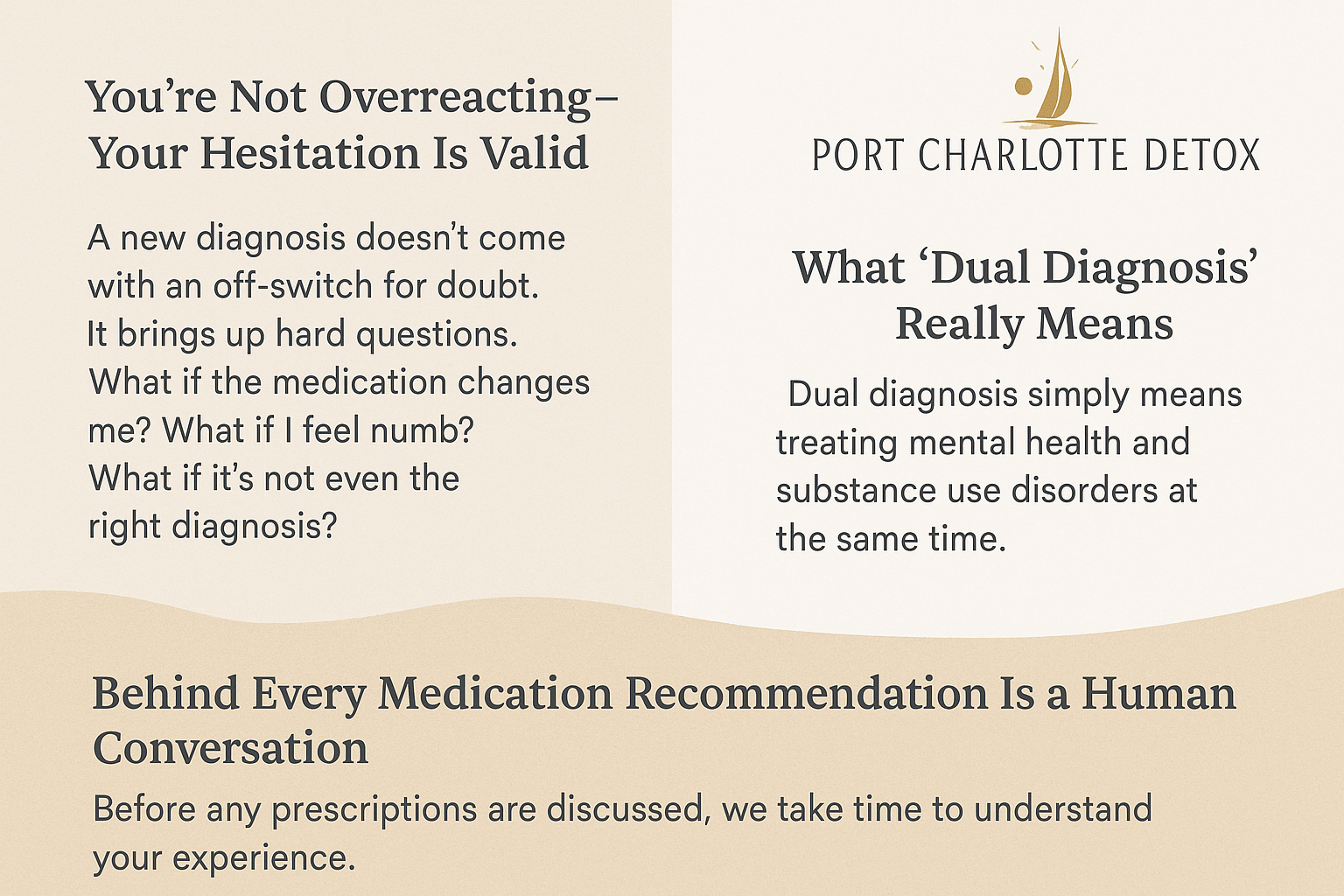Your first diagnosis hits like a whisper and a wave.
You hear the words—bipolar, schizoaffective, generalized anxiety—but they don’t land all at once. What you feel first is fear. Not just fear of the label, but of what comes next.
Especially the part where someone says, “You might need medication.”
At Port Charlotte Detox, we meet people at that very moment every day. Some are still processing the name of their diagnosis. Others are wondering if accepting help will mean losing something they love about themselves—creativity, depth, energy, intuition.
We understand. And we want you to know: this process doesn’t have to be rushed, and it certainly doesn’t have to feel like erasing who you are. If you’re looking for Dual Diagnosis Treatment that honors your fear and your identity, you’re in the right place.
You’re Not Overreacting—Your Hesitation Is Valid
A new diagnosis doesn’t come with an off-switch for doubt.
It brings up hard questions. What if the medication changes me? What if I feel numb? What if it’s not even the right diagnosis?
If you’ve ever asked these questions, you’re not resisting help—you’re being wise with your hope.
There’s a long history of people being misdiagnosed, overmedicated, or not taken seriously. So it makes sense to be careful. But caution doesn’t mean you have to walk this alone. At our center, we see your questions as part of the process—not a barrier to care.
What “Dual Diagnosis” Really Means
Dual diagnosis simply means treating mental health and substance use disorders at the same time.
This might be someone with panic attacks who drinks to cope. Someone with depression who uses stimulants just to get out of bed. Or someone whose symptoms became clearer after they stopped using.
What’s important to understand is that dual diagnosis isn’t about blaming the substance or the diagnosis—it’s about recognizing how they interact. Treating only one side is like fixing a leak without turning off the water.
That’s why our program includes licensed mental health clinicians, medical professionals, and addiction specialists working together to support the whole person.
Behind Every Medication Recommendation Is a Human Conversation
We want to be clear: medication isn’t the starting point.
You are.
Before any prescriptions are discussed, we take time to understand your experience. We ask questions like:
- What symptoms are interfering with your life most?
- Have you tried medication before—and how did it go?
- What are you most afraid of with treatment?
- What parts of yourself feel most fragile—or most worth protecting?
These aren’t side questions. They shape everything about your care plan.
If medication becomes part of that plan, it’s always introduced gently, backed by science, and adjusted with you, not to you.
Modern Medication: Safe, Slow, and Flexible
There’s no one-size-fits-all pill in dual diagnosis care.
The medications we may explore are clinically tested, monitored carefully, and reviewed frequently for both safety and effectiveness. Some options are designed to stabilize mood. Others help with severe anxiety or symptoms of psychosis. And all are prescribed with a clear, transparent rationale.
What you won’t get here:
A rushed prescription. A mystery diagnosis. A “just trust us” approach.
What you will get:
Time. Information. Consent. Options.
Because we know the goal isn’t just symptom reduction—it’s restoring the clarity and steadiness that let you feel like you again.
“I was terrified I’d lose my spark. What I actually lost was the constant static in my head. I didn’t feel less—just less overwhelmed.”
– Dual Diagnosis Client, 2024

What If I Don’t Want Medication Right Now?
That’s okay.
Some people start with therapy and skills-building first. Others use temporary medications for stabilization, then taper down. Still others try, pause, adjust.
This is not a lock-in contract. It’s a care relationship.
Our facility provides a range of supports, including:
- One-on-one psychiatric and therapeutic care
- Group therapy with people who get it
- Holistic and creative modalities (like mindfulness, yoga, art)
- Case management and life skill coaching
- Discharge planning that sets you up for long-term stability
And no matter what, you’re never punished for needing time.
Where Compassion Meets Clinical Care
In places like Charlotte County and nearby Fort Myers, we’ve worked with people from all walks of life who hesitated—then found peace in understanding their brains better.
For some, the diagnosis felt like a curse at first.
Later, they began to see it as a language they finally spoke.
For others, the idea of needing medication hit hard.
But eventually, they saw that taking care of their brain was no different than treating a heart condition, a thyroid imbalance, or diabetes. It wasn’t about weakness—it was about wisdom.
What Progress Looks Like in Dual Diagnosis Care
Here’s what success can look like—not overnight, but over time:
- Being able to sleep through the night without dread
- Laughing and actually meaning it
- Going a full week without self-medicating
- Noticing your thoughts slow down enough to breathe between them
- Feeling proud of how you handled something stressful
- Realizing you don’t hate yourself for needing help
And most of all—finally feeling like you’re on your own side.
FAQs About Dual Diagnosis Treatment and Medication
What is dual diagnosis treatment, exactly?
It’s a type of care that addresses both a mental health condition and a substance use disorder at the same time. These issues often overlap, and treating them together improves outcomes and reduces relapse risk.
Do I have to take medication if I start dual diagnosis treatment?
No. Medication is never forced. It’s offered as a tool, not a requirement. Many clients explore non-medication options first or use medication temporarily while learning other coping strategies.
Will medication change my personality?
That’s a common fear. Most people find that when properly matched and monitored, medication helps restore who they are—not erase it. If something doesn’t feel right, we adjust together.
What if I’ve had a bad experience with medication in the past?
That matters—and we want to hear about it. Your history informs your care plan. We’ll work with your past providers if needed and offer options that address previous concerns.
Is dual diagnosis care available near me?
Yes. Port Charlotte Detox serves individuals across Charlotte County and Fort Myers, with a compassionate team ready to walk with you at your pace.
Can I still be creative or “myself” if I take medication?
Absolutely. We hear this concern often, especially from artists, empaths, and big-feeling people. The right treatment should support your gifts—not silence them.
If You’re Standing at the Edge of This Decision…
Take your time—but don’t stay stuck alone.
Whether you’re newly diagnosed, unsure about medication, or afraid treatment will change something sacred in you—we’re here to meet you with honesty, respect, and care.
You are allowed to protect your identity and get support. You are allowed to say “I’m scared” and take one small step forward.
Because whatever brought you here today—it matters. And so do you.
Call (844)336-2690 to learn more about our Dual Diagnosis Treatment services in Port Charlotte, Florida.


